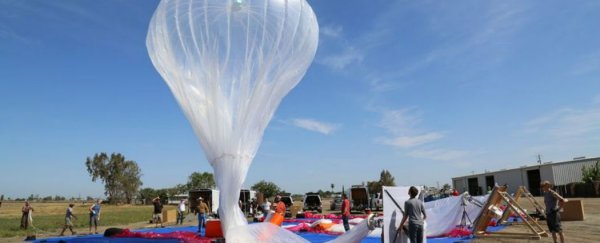Google has teamed up with the Sri Lankan government to deliver broadband Internet to every region of the island nation, making it the first country in the world to have universal Internet coverage. The initiative is part of Google's Project Loon, which aims to provide cheap or free Wi-Fi to people in remote rural areas around the world via a fleet of huge helium-filled balloons floating way up in the stratosphere.
Right now, of the 22 million mobile phones being used in Sri Lanka, 2.8 million of them are connected to the Internet, so if the initiative goes ahead, it could change a whole lot of lives. "Hopefully in a few months every person and every device on the island will be covered by 3G," Sri Lanka's Deputy Minister of Economic Development, Harsha de Silva, said on Facebook.
Since launching in 2011, Project Loon has been testing the technology high up above New Zealand, Brazil, Australia, and the US, but it's finally ready to launch for real. As Richard Nieva reports for CNET, this week Google signed a preliminary agreement - known as a memorandum of understanding - with the government of Sri Lanka, which means both parties will do their best to make it happen, but nothing has been finalised yet.
Right now, the plan is to have everything up and running by early next year, with 13 balloons to be launched in March. They will be floating twice as high as passenger planes - about 19 kilometres up - and receiving Wi-Fi signals from grounded stations below. The balloons will bounce these signals along to each other, and every time a balloon receives a signal, it will transmit it to an area of about 40 km in diameter below, allowing people to directly connect to the 3G network using their smartphones and other devices.
"Unfortunately, the balloons can't stay up there forever - Google plans to replace them every 100 days or so," Adam Epstein reports for Quartz. "In order to keep their operational costs down, local Internet service providers will have access to them."
"Service providers will enter into agreements with 'floating cell towers' that will be shared bringing down transmission costs leading to further reductions in cost of service provision," de Silva said in a press statement. "This should give more space for them to improve technology, content and service."
We don't want to get too excited in case everything falls apart before March, but we are so ready for Sri Lanka to make history. Watch this space.
